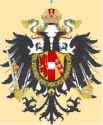Coat of Arms For Galicia in the Austrian Empire
1772
Austria under Empress Maria Theresa (reigned 1740-1780) claims Galicia and Volhynia in the first partition of Poland. They become crown lands of the empire.
1772
A new code of regulations is established under which the Jews of Galicia are to be governed, and a system of congregational districts is created under a general administration (Generaldirektion) headed by the Chief Rabbi of the entire community.
1772-1848
Jews are subjected to special taxes by Vienna and restrictions are placed on occupations connected to trade. Jewish marriages are now supervised by the state.
1774
Bukowina with 75,000 inhabitants becomes a crown land of Austria.
1776
There are 144,200 Jews in Galicia. Three quarters of them live in the eastern part, mainly in cities and towns. A significant part of the population of Drohobycz is Jewish. The Austrian government reorganizes the internal governance of the Jewish community.
Serfdom is abolished. Land continues to be held by the Polish ruling class. The Emperor passes an Edict of Toleration (Toleranzpatent), extenidng religious freedom to non-Catholic Christians in the empire.
1781
Galicia is divided into circles (Kreise) for government administration
1783
Reign of Joseph II
During his short reign, Joseph attempted to give minorities more rights in the empire. He attempted to discourage the Jews from their traditional occupations of trade and crafts, especially as agents of landowners in the arenda system, by encouraging their settlement on farms. This measure did not succeed. However, laws passed at the same time to restrict Jewish involvement in trades damaged the position of Jews in the rural economy. The Emperor established German schools in every community and encouraged Jewish attendance.
1780-1790
Joseph II further reorganizes Jewish governance making it more subservient to the state.
1787
The Austrian government decrees that all Jewish families adopt hereditary surnames. Jewish governance is also modified further. Jews are now allowed the privileges of settling anywhere and are free to practice their religion. The limitations on marriage imposed in 1772 are lifted. However, autonomy in governance is restricted, making Jewish citizens subject to the state in administrative and judicial matters.
1785
All Jews are now subject to military conscription.
1789
1788
End of 18th century
About 500,000 Jews live in Galicia
Joseph II dies. His successors do not continue his reform. Economically Galicia begins to lag behind other parts the Austrian Empire.
1790
1846
The Polish peasants of western Galicia revolt
The Edict for Toleration for Jews is passed. In the western regions of Austria, it gave Jews a measure of equality. It extended to them the freedom to pursue all branches of commerce, to own and work the land, and to open factories. They were permitted to learn trades , but not allowed to become master craftsmen. They were allowed to attend schools and universities, practice medicine and law, and serve in the military. Some taxes that had been specific to Jews were abolished. Hebrew and Yiddish were to be replaced by the official languages of the country, except in matters of religion. Jewish marriage, divorce, and burial practises now had to conform to the law of the state.
1782
An Edict of Toleration (Judenordnung) passed on May 7 for Gaiia promised Jews equal treatment under the law and freedom of worship. Jews were given the right to own rustical real esrtate in Galicia.


